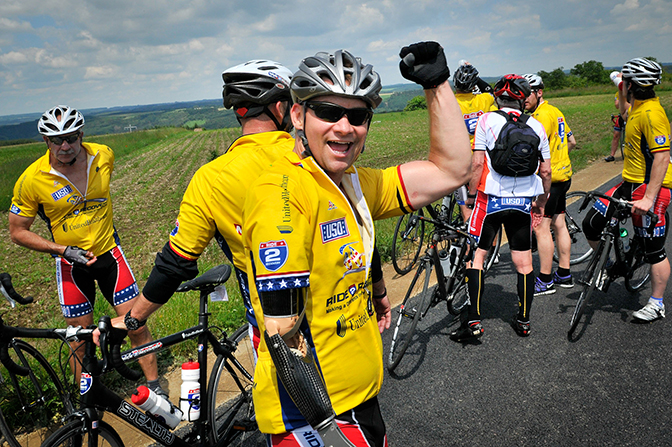
Growing up in a suburb of Boston, Kenny found that a bike was not only a means of transporation, but also a lot of fun. As an Airborne Infantryman in the 82nd Airborne Division with one tour to Afghanistan and three to Iraq, Kenny’s mountain bike at Fort Bragg didn’t get as much use with all of the training and deploying.
After losing his right arm above the elbow from IED blast in Baghdad, Kenny wondered how he could ride a bike again.
Through another soldier at Walter Reed National Medical Center, Kenny met John Wordin and Ride 2 Recovery He was outfitted with his first road bike and prosthesis and rode almost 400 miles on the Texas Challenge in 2009.
Kenny’s bike is a Raleigh Sortie Black Dual Suspension. Working with Kenny’s prosthesis, he has a very special prosthetic arm that utilizes a Fox Rear Suspension unit to help take up the bumps and vibrations of the road and trail. Using a R2R custom adapted Shimano DI2 Electronic shifting and hydraulic braking set up, Kenny is able to shift and brake both derailleurs and shifters using one hand with precise control.
“TheTexas ride was eye opening - seeing how others with similar and far more serious disabilities conquer the road on specially adapted bikes,” said Kenny. It was very inspiring and provided me with a great deal of motivation for recovery.”
Though he prefered mountain biking, getting back on a road bike was a safer first step.
“I found cycling to be challenging, which I liked,” he said. “I enjoyed the camaraderie of my fellow wounded service members. I benefited from being in a group of peers during the early stages of recovery, it was a comfortable atmosphere.”
Not to be held back, Kenny pushed himself to return to mountain biking. In 2011, Kenny was invited to ride in the W100 – an annual three-day, 100 kilometer mountain bike ride in Texas with President George W. Bush.
The next Challenge was the Leadville 100 - 100 miles across the high-altitude, extreme terrain of the Colorado Rockies – where he earned his belt buckle on his first attempt in 2012 by completing the course in under twelve hours. His goal for 2013 is under ten hours.
“Cycling had been a lifelong activity that, until being injured, I took for granted, said Kenny. “Now, post-injury, cycling has become a source of fitness, enjoyment, and personal accomplishment, as well as an opportunity to demonstrate to others that disabled cycling is both possible and rewarding.”